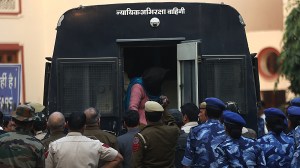P. Vaidyanathan Iyer is The Indian Express’s Managing Editor, and leads the newspaper’s reporting across the country. He writes on India’s political economy, and works closely with reporters exploring investigation in subjects where business and politics intersect. He was earlier the Resident Editor in Mumbai driving Maharashtra’s political and government coverage. He joined the newspaper in April 2008 as its National Business Editor in Delhi, reporting and leading the economy and policy coverage. He has won several accolades including the Ramnath Goenka Excellence in Journalism Award twice, the KC Kulish Award of Merit, and the Prem Bhatia Award for Political Reporting and Analysis. A member of the Pulitzer-winning International Consortium of Investigative Journalists (ICIJ), Vaidyanathan worked on several projects investigating offshore tax havens. He co-authored Panama Papers: The Untold India Story of the Trailblazing Offshore Investigation, published by Penguin. ... Read More
Lend us to build, we can stave off recession: PM
While back home, the markets joined a savage global equities rout plunging over 10% to their lowest in three years in the face of fears of a global economic slowdown...

While back home, the markets joined a savage global equities rout plunging over 10% to their lowest in three years in the face of fears of a global economic slowdown, Prime Minister Manmohan Singh said here today that India’s real economy will feel the pain but along with other developing countries, it can stave off threats of a global recession if multilateral financial institutions inject liquidity and lend copiously to fund infrastructure in these economies.
“This can be a counter-cyclical device and act as a powerful stabiliser,” Singh said, addressing 45 countries at a working dinner on the opening day of the Asia and Europe Meeting’s (ASEM’s) seventh summit in Beijing. One of the select few world leaders requested to speak at the banquet dinner, Singh elaborated in detail how the crisis of confidence in global financial markets is spilling over to the real economy and adversely affecting developing countries.
Significantly, he scaled down the Gross Domestic Product growth rate estimate for India to 7-7.5 per cent in 2008-09 because of the global slowdown of export demand and capital inflows. This is lower than the projection of 7.5-8 per cent made by the Reserve Bank of India that is traditionally conservative. In the last three years, India grew an average of over 9 per cent.
“We realise we cannot remain totally unaffected… Our stock markets and the exchange rate of the rupee are under pressure due to capital outflow of foreign institutional investors (FIIs),” the Prime Minister said, attributing the lower growth rate in India to the global slowdown of export demand and capital inflows.
Indeed, India’s stock markets have plummeted 11,586 points or 57 per cent this calendar year 2008 to touch 8,701 on Friday. The FIIs have so far pulled out a net $12.2 billion from the equity markets after buying a record $17.4 billion last calendar. The huge capital outflows have pushed the rupee down over 21 per cent this year. It breached the psychological Rs 50 to a dollar mark before closing at Rs 49.95 today.
According to Singh, developing countries will face reduced demand for goods and services, particularly exports, lower access to trade and supplier credits. “This superimposed on other crises — food and fuel price rises — have strained budgets and balance of payments leading to rising inflation and living costs in many developing countries,” he said.
Rising prices of global crude oil and commodities had fuelled inflation rate even in India to 12.82 to a 16-year high for the week-ending August 16. A sharp slide in their prices subsequently has now brought down prices, though the inflation rate continues to be at an uncomfortable level of about 11 per cent in October second week.
Singh said the International Monetary Fund and the World Bank must put in place exogenous shock facilities to provide large funds to the affected countries, but with less conditionalities and greater flexibility. “Countries with stock foreign exchange positions could make additional resources available to the international financial institutions on appropriate terms to finance their operations,” Singh added.
The first task clearly is to declog the credit markets the world over to restore a measure of confidence. “The IMF should revisit the potentially powerful instrument of creating liquidity through fresh allocation of Special Drawing Rights (SDRs) in favour of multilateral development finance institutions,” he said.
SDR is a potential claim on the freely usable currencies of IMF members. Holders can obtain these in exchange for their SDRs in two ways: first, through the arrangement of voluntary exchanges between members; and second, by the IMF asking members with strong external positions to purchase SDRs from members with weak positions.
Setting the tone for the Group of 20 countries’ summit called by US President George Bush in Washington on November 15 — which Singh is most likely to attend — the Prime Minister said the crisis was because of a massive and unacceptable failure of the regulatory and supervisory mechanism in developed economies. “The sad truth is that in this age of globalisation, we have a global economy of sorts, but it is not supported by a global polity to provide effective government,” he said.
According to him, a global monitoring authority to promote global supervision and cooperation in an increasingly integrated world will help prevent such meltdowns in the future. Singh expressed his desire to cooperate and coordinate India’s actions with the world to find effective and pragmatic solutions to the formidable challenges the world economy faces.



- 01
- 02
- 03
- 04
- 05





























